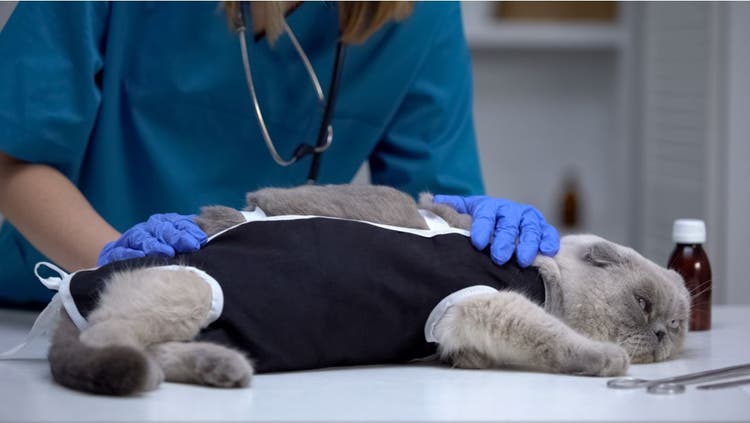
Spaying Your Cat: A Post-Operation Guide
If you’re planning on bringing home a new kitten, one of the first tasks you’ll be faced with is either getting your kitten spayed or neutered and then caring for your kitten post-operation. Having your cat spayed or neutered can have many health, financial, and behavioral benefits. Caring for your kitten post-op is easy, follow our tips below to keep your new furry family member healthy and happy following their spaying or neutering procedure.
What is Spaying or Neutering?
First, the spaying procedure is done on female kittens and the neutering procedure on males. The spaying procedure, medically known as an ovariohysterectomy, is the surgical procedure in which both ovaries and most of the uterus is removed from your kitten’s body.
Neutering, on the other hand, is medically called an orchiectomy or castration, and entails the removal of the testicles of a male kitten. The two procedures may be different in their execution, but their end goal is the same. Once a kitten has been spayed or neutered they are no longer able to produce offspring. But that’s not where the benefits end.
The Benefits of Spaying and Neutering Your Kitten
The benefits of spaying or neutering your kitten go far beyond simply eliminating their ability to have young. From behavioral improvements to far-reaching positive health implications, spaying or neutering your new kitten can have an impactful positive effect on your kitten for the rest of its life.
The Benefits of Spaying:
- It prevents your cat from going into heat.
- It prevents your cat from getting pregnant.
- It may make your cat more gentle and affectionate.
- It may help prevent your cat from getting breast cancer later in life.
- It prevents your cat from getting an infection in the uterus later in life.
- It prevents cancer of the uterus or ovaries.
- The cost of spaying is far less expensive than the cost of raising a litter of kittens.
The Benefits of Neutering:
- It prevents your kitten from getting a female kitten pregnant.
- It may make your kitten more gentle and affectionate.
- It may keep your kitten from roaming and getting into fights with other animals.
- It prevents your kitten from getting cancer of the testicles or prostate gland later in life.
- It helps prevent your cat from spraying urine in the house.
- The cost of neutering is far less expensive than the cost of raising a litter of kittens.
The Day of Your Kitten’s Operation
When the day comes for your kitten to be spayed or neutered, there are a few steps your vet will ask you to take to ensure your kitten has a successful operation. But take note; all instructions are subject to your vet’s recommendations. Your vet will give you detailed instructions to follow the morning of your kitten’s surgery; make sure that you follow those instructions exactly.
First, you’ll need to take up your cat’s food and water at night so that they can’t eat through the night or eat in the morning. Next, you’ll need to load your kitten into his or her carrier and take them to the vet. Your vet will most likely ask you to drop off your kitten early in the morning so that they have ample time to perform the surgery and monitor your kitten as he or she wakes up post-op. Give your kitty lots of love when you drop him or her off before saying goodbye.
The actual surgery will only take about 30 minutes, but your vet will keep your kitty around until they have woken up from their anesthesia. When you pick your kitten up from the vet, they’ll provide you with detailed post-op instructions. Those instructions will most likely include:
- Keep your kitten in its e-collar at all times until your vet gives you the clearance to remove it. This will most likely be around 10 days post-op. You’ll need to leave it on when your cat is eating, sleeping, and up and about. No exceptions.
- Keep an eye on your kitten’s stitches to monitor its recovery. If the area becomes inflamed or discolored, talk to your vet.
- Keep your cat calm in the two weeks after its surgery. Some vets may recommend secluding your kitten in a smaller room when you leave to limit their mobility.
- If there are other cats in your house, you’ll need to keep your cats separated post-op. Your kitten’s e-collar will keep it from licking its stitches, but there will be nothing to stop your other cat from licking your kitten’s stitches while you’re at work if you leave them together. When you’re home, make sure that you’re keeping your older cat from aggravating your kitten’s surgical wounds.
- You may need to get creative with your feeding routine. With the e-collar on, some kittens won’t be able to eat out of their food dish. Most have found success by elevating their kitten’s dish so that the e-collar doesn’t hit the floor while they’re eating.
- You’ll need to keep up with your cat’s pain management routine carefully post-op. Attach a magnetic whiteboard to your fridge so that you can write down when you last gave your kitten its meds and when it will need them again.
Keeping Your Kitten Happy Post-Op
If you follow all of our tips above, you’ll find that keeping your kitten happy and healthy post-op can be easy. Make sure to keep a watchful eye on your kitten and watch for any adverse reactions to the procedure. If you have any questions or become concerned about your kitten’s health, call your vet immediately.